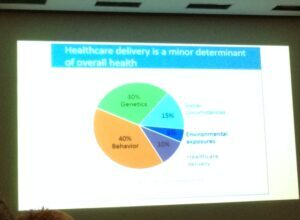Software development is a fertile and profitable field nowadays. One niche of it – the healthcare software development industry has been ripe with opportunities for businesses and professionals alike. With the rise of technology and its continuous advancement, there has been a growing demand for high-quality healthcare software that can improve patient outcomes and streamline processes in healthcare facilities. That’s the reason why the industry has yielded approximately $600 billion in revenue by 2023.
- What Is Healthcare Software Development?
- Various Types of Healthcare Software
- Electronic Health Records (EHR) Software
- Healthcare Practice Management Software
- Telemedicine Software
- Medical Diagnostic Software
- Patient Engagement Software
- Medical Billing Software
- Health Information Exchange (HIE) Software
- Healthcare Mobile Applications
- Notable Considerations When Developing Custom Healthcare Software
Before jumping into this industry, it is vital to comprehend the unique considerations and challenges that come with developing healthcare software. Those are what we will discuss in this document.
What Is Healthcare Software Development?
This term is also technically referred to as medtech software development, which is the process of ideating, designing, and building an application system for a specific use in the healthcare sector. Such software applications can range from simple data management systems to complex medical devices, such as diagnostic tools or electronic health records (EHRs).
In an era of digital transformation, more and more health institutions have been adopting technical solutions to improve their workflow, reduce manual errors, and enhance patient care. This not only opens more good opportunities for healthcare officers or patients but also paves the way for IT companies to introduce their services of outsourcing healthcare software development.
Due to the importance of life and healthcare data involved, the development of healthcare software requires a combination of medical expertise, regulatory compliance knowledge, and technical skills. Therefore, companies, groups, or even individuals have lots of things to keep in mind before embarking on a healthcare software development project.
Various Types of Healthcare Software
Healthcare software development has made it easier for healthcare professionals to access and manage patient records, provide virtual consultations, and monitor patients remotely. This has made healthcare services more efficient, cost-effective, and patient-centered. There are various types of healthcare software that cater to different healthcare needs:
Electronic Health Records (EHR) Software
EHR software is a prevalent healthcare technology that revolutionizes the way medical records are kept. Rather than traditional paper-based methods, it digitally compiles patient data such as medical history, diagnoses, and treatment plans. This allows healthcare professionals to swiftly access and exchange patient information, enhancing care continuity and ultimately leading to improved patient outcomes.
Healthcare Practice Management Software
This software is engineered to automate and simplify the administrative aspects of healthcare facilities. It assists healthcare providers in managing their workflow, reducing administrative tasks, and boosting overall efficiency. Key features include appointment scheduling, reminders, billing, and claims management.
Telemedicine Software
Telemedicine software permits healthcare providers to remotely consult and treat patients. Regardless of geographical barriers, patients can connect with their healthcare providers at their convenience. The software includes video conferencing, live chat, and messaging capabilities, providing a convenient and accessible healthcare experience.
Medical Diagnostic Software
This software empowers healthcare providers to streamline the diagnostic process. Leveraging artificial intelligence and machine learning, it interprets medical images like X-rays, MRI scans, and CT scans. This leads to more accurate diagnoses, enabling more effective treatment plans and improved patient outcomes.
Patient Engagement Software
This software equips healthcare providers to enhance patient experiences. Utilizing patient data enables personalized care plans, encourages patient education, and empowers patients to manage their health. Features include mobile health applications, patient portals, and tailored messaging services.
Medical Billing Software
This software automates the medical billing and coding process, from claim submission to insurance providers to tracking reimbursements. Offering accurate and timely billing it reduces claim rejections and denials and fosters financial transparency and accountability. When choosing medical billing software, consider one that integrates with your Practice Management System or Electronic Health Records, provides quick and reliable customer support, and stays current with billing and coding standards.
Health Information Exchange (HIE) Software
HIE software provides a secure and efficient platform for exchanging patient health information among healthcare providers and organizations, irrespective of their EHR systems. It can enhance care coordination, improve patient safety, and reduce healthcare costs by minimizing duplicate tests and procedures. When selecting an HIE vendor, ensure they offer robust security measures, clear privacy policies, and compatibility with multiple EHR systems.
Healthcare Mobile Applications
The surge in smartphone usage has spurred the development of a variety of healthcare apps. These range from fitness and wellness trackers to medication reminders and remote monitoring tools. Healthcare mobile apps provide patients and healthcare providers with easy access to health information and tools that promote self-care and chronic disease management.
Notable Considerations When Developing Custom Healthcare Software
When forging software solutions for the healthcare sector, there are several unique factors that demand careful attention:
- Regulatory Compliance: At the forefront of priorities in healthcare software creation is achieving compliance with key regulations like HIPAA (Health Insurance Portability and Accountability Act) in the U.S. and GDPR (General Data Protection Regulation) in Europe, along with other nation-specific data privacy laws. This is pivotal to safeguarding delicate patient data and preserving their trust.
- Interoperability: Given the myriad of systems employed in healthcare facilities, it’s imperative that any new software can effortlessly integrate and interact with these existing systems. This capability facilitates easy sharing of patient data across different providers and bolsters the overall efficiency of the healthcare ecosystem.
- User-Friendliness: Healthcare professionals juggle a multitude of tasks daily; hence, any software they utilize must be straightforward to learn and use consistently. A user-friendly interface complemented by intuitive features is the cornerstone of successful healthcare software adoption.
- Integration: It is essential to craft software that cohesively fits into the existing medical systems within a healthcare practice. This integration facilitates a seamless flow of data, enhances staff efficiency, and reduces workload. For instance, medical staff may employ Electronic Medical Records (EMR) software to streamline patient records, automate repetitive tasks, and monitor medication and treatments. It’s crucial to ensure your healthcare software can mesh with other systems like Laboratory Information Systems (LIS) and Radiology Information Systems (RIS).
- Scalability: Custom healthcare software should be designed to scale with your practice as it expands. This scalability is vital to conserving resources and maintaining high levels of efficiency. As your organization grows, your digital infrastructure will likely require enhancements to meet increased demand. Therefore, when developing medical software, it is essential to ensure it can evolve alongside your practice.
- Security: Alongside regulatory compliance, security stands as a major concern in healthcare software development. Any security vulnerabilities or breaches can result in severe repercussions for both patients and providers. Hence, robust security measures need to be implemented throughout the entire development process.







